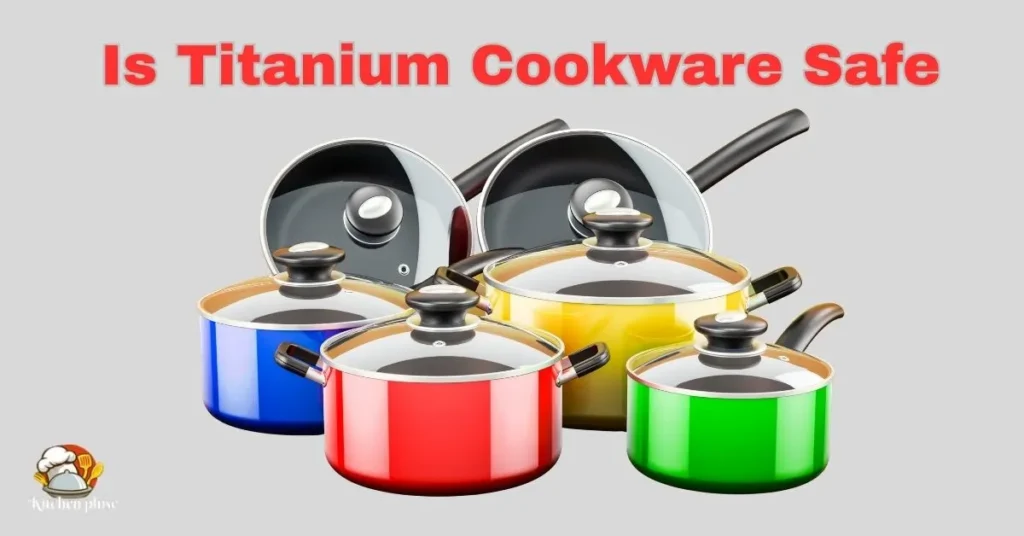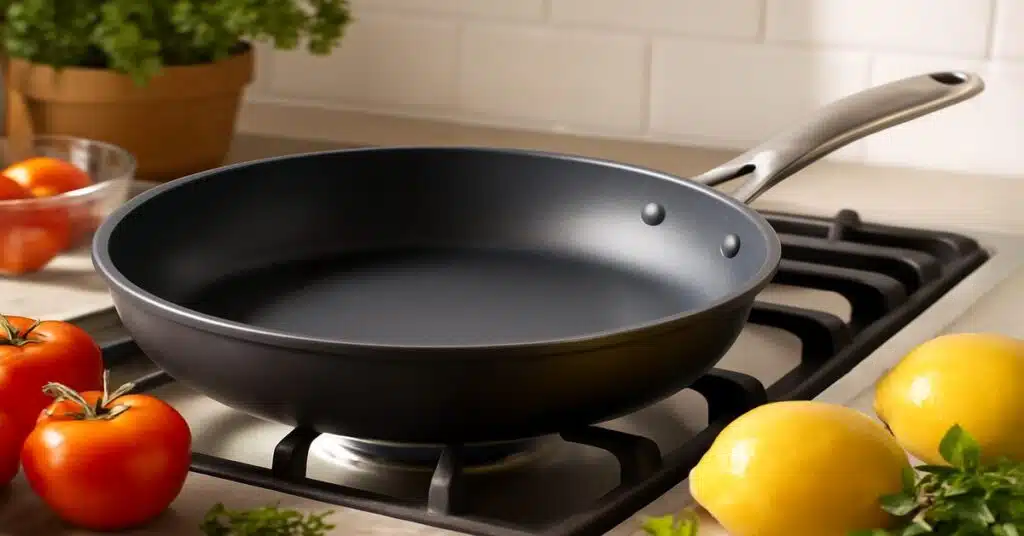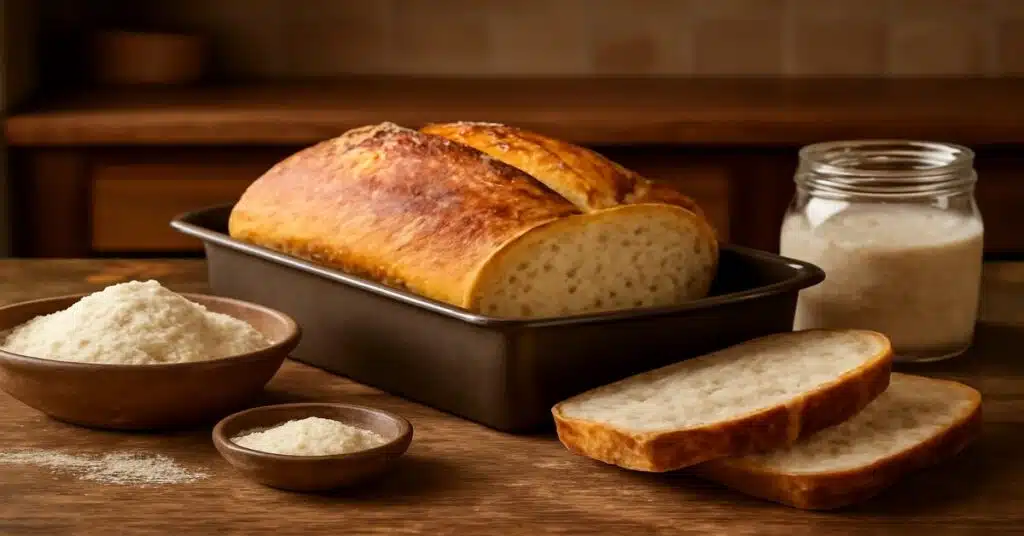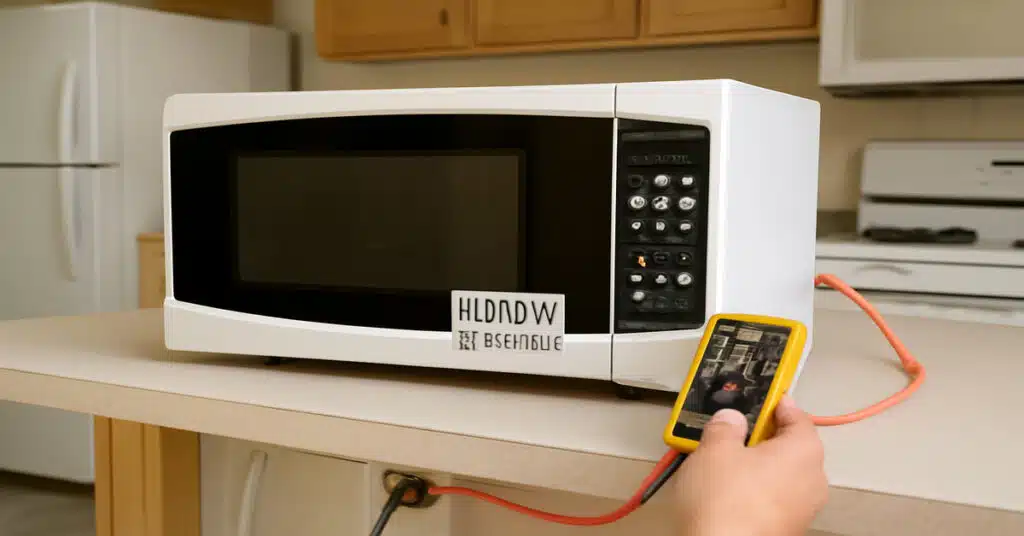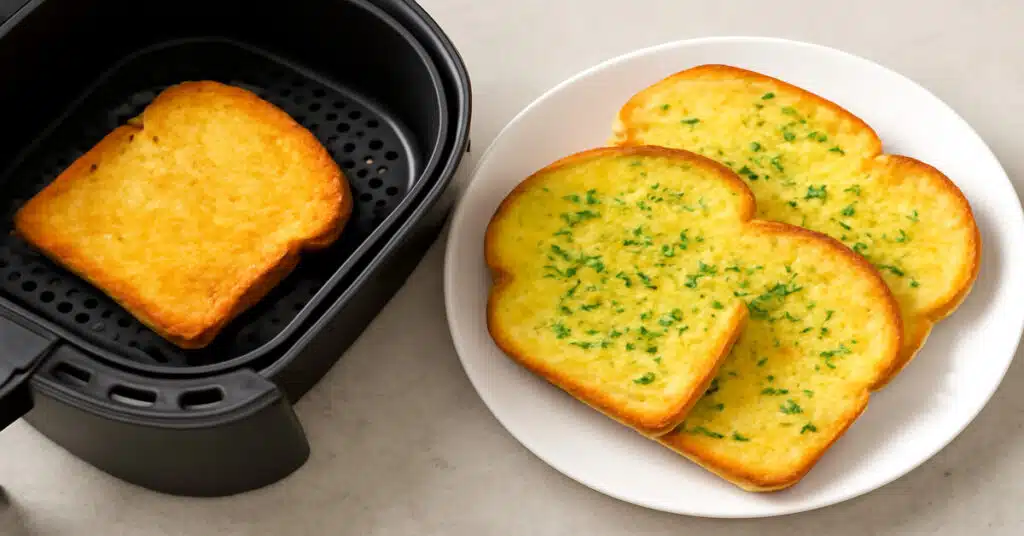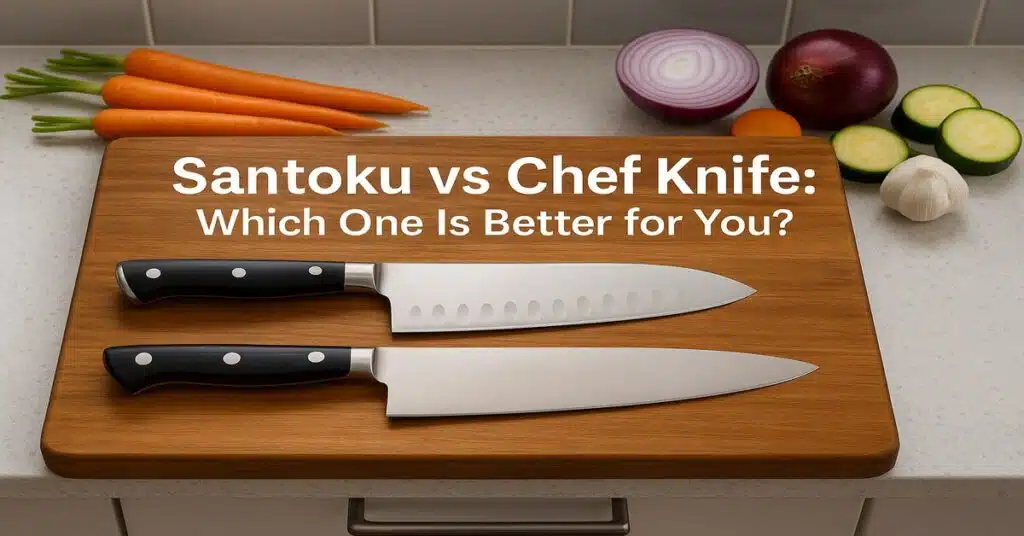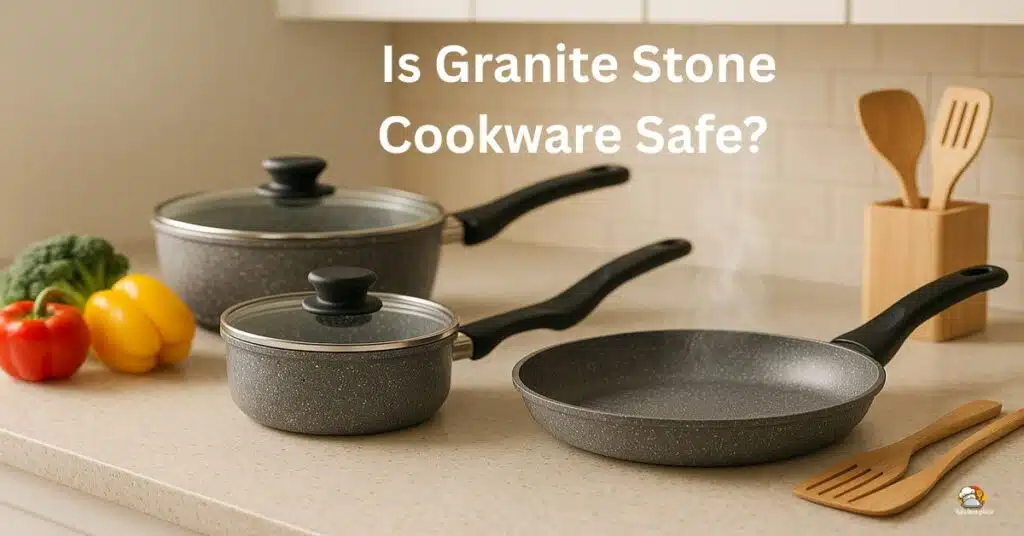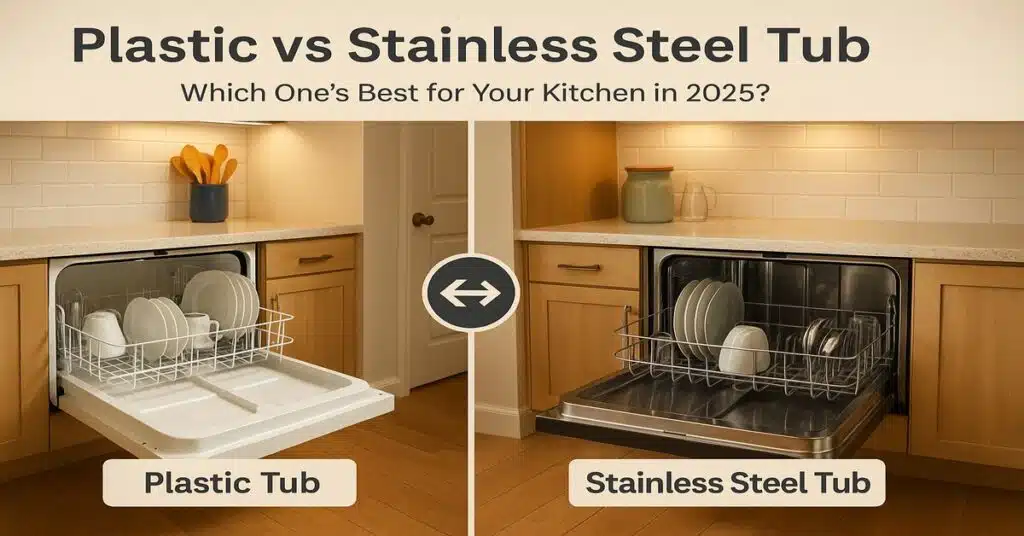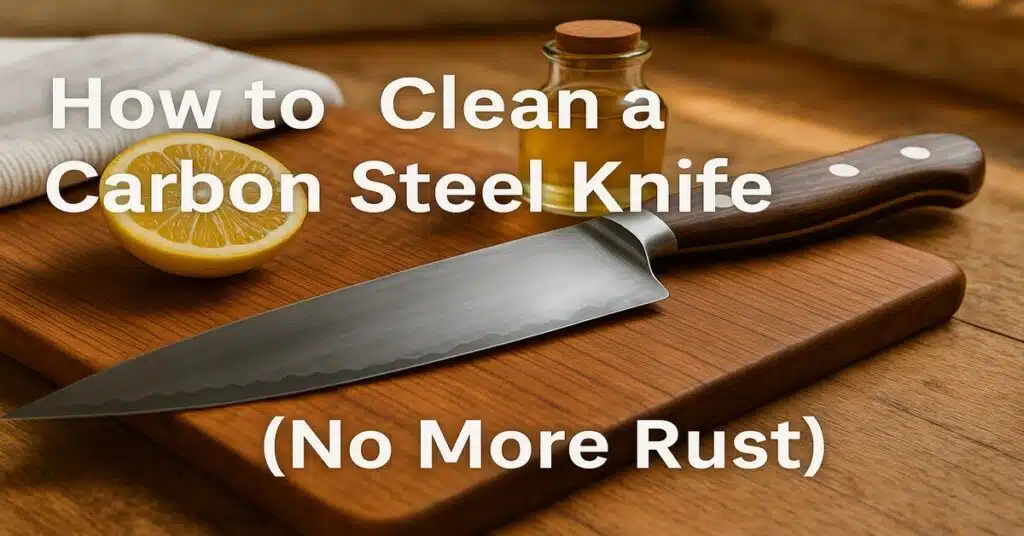Titanium cookware is generally safe for cooking — but only if you choose the right type.
Pure titanium and titanium-reinforced stainless steel do not leach into food and are considered non-toxic by food safety authorities.
The real health risks come from cheap titanium-coated nonstick pans, where low-quality coatings can scratch or wear out over time.
In this guide, I’ll explain which titanium cookware is truly safe, what the science and FDA say, and how to avoid misleading “titanium” marketing before you buy in 2026.
I still remember the first time I bought a shiny titanium frying pan. Honestly, I was excited — it felt so light compared to cast iron. The promise of “non-toxic, non-stick, and built to last” sounded almost too good to be true.
What Is Titanium Cookware?
Titanium cookware comes in different forms. To understand safety, you first need to know what type you’re dealing with.
Pure Titanium Cookware
This is 100% pure titanium, often used in camping cookware because it’s extremely lightweight, rust-proof, and durable. If you’re a backpacker or hiker, a titanium pot is perfect for boiling water and cooking simple meals outdoors.
From my experience: Pure titanium doesn’t leach into food and is one of the safest metals you can cook with.
FDA also recognizes titanium as a non-toxic, food-safe metal that does not react with food under normal cooking conditions FDA Source.
Titanium-Coated Cookware (Nonstick):
This is where confusion often starts. Many “titanium” pans sold in stores are actually aluminum pans with a titanium-infused nonstick coating (ceramic or PTFE-free).
- Safe if you buy from reputable brands.
- Risks arise if the coating is poor quality — it may scratch, wear out, or release harmful substances over time.
Always check if it’s PTFE-free and PFOA-free.
Titanium-Reinforced Stainless Steel (316Ti)
High-end cookware brands use stainless steel reinforced with titanium (316Ti). This type is:
- Durable and corrosion-resistant
- Heavier than pure titanium
- Ideal for everyday cooking in the kitchen
Personally, I like this type for daily use because it combines the durability of stainless steel with titanium’s safety.
Is Titanium Cookware Safe for Everyday Cooking?
Food safety authorities recognize titanium as a biocompatible, non-toxic metal that does not react with food under normal cooking conditions.
Scientific & FDA Perspective:
According to the FDA and scientific reviews, titanium is considered “biocompatible, non-toxic, and corrosion-resistant” — meaning it doesn’t break down or leach into food under normal cooking conditions (NCBI Study, Chefs Resource).
In simple terms: you can safely cook both acidic foods (like tomatoes and vinegar) and everyday meals in titanium pans without worrying about harmful chemicals.
Myths vs Facts:
- Myth: Titanium cookware leaches into food.
- Fact: Pure titanium is non-reactive and stable. The only risks come from cheap titanium coatings that may wear off over time.
Coated vs Uncoated Safety:
- Pure Titanium or Titanium-Reinforced Stainless Steel (316Ti): Very safe, long-lasting, and reliable.
- Titanium-Coated Nonstick Cookware: Safety depends on quality. Low-grade coatings may scratch, peel, or release unwanted substances.
My rule of thumb: If you want cookware for long-term use, choose pure titanium or 316Ti stainless steel. If you prefer nonstick, make sure the coating is PTFE-free and PFOA-free.
Key Benefits of Titanium Cookware
Non-Toxic & Non-Reactive Surface:
Pure titanium is one of the safest non-toxic cookware options available. It does not react with acidic foods like tomatoes or vinegar. Many doctors even call it hypoallergenic cookware, meaning it’s safe for people with metal allergies. Plus, since it’s a chemical-free cookware choice, you don’t have to worry about harmful coatings.
Lightweight & Durable:
Titanium is famous for being a durable lightweight cookware material. It’s stronger than aluminum yet lighter than stainless steel. If you’re looking for the best titanium frying pan, this combination makes it perfect for everyday cooking. At the same time, it’s an eco-friendly cookware option because it lasts for years, reducing waste.
High Heat & Oven-Safe Performance:
Most titanium pans are titanium cookware oven safe, handling temperatures much higher than regular nonstick pans. As a heat resistant cookware type, titanium doesn’t release harmful fumes when exposed to high heat, unlike Teflon.
Easy to Clean & Rust-Resistant:
Cleaning titanium is hassle-free. It’s known as easy to clean cookware, needing only warm water and a soft sponge. Being a rust resistant cookware, it won’t corrode like cast iron. For long-lasting shine, follow simple titanium cookware cleaning tips such as avoiding steel wool.
Common Risks of Titanium Cookware
Coating Wear & Scratching Issues:
Many pans sold as titanium are actually aluminum with a thin titanium coating. Over time, this coating can scratch or peel. This is one of the main titanium cookware disadvantages. If scratched, the pan may lose safety and nonstick quality, raising titanium non stick pan safety concerns.
Always check coating details before buying.
Uneven Heat in Cheap Cookware:
Low-cost brands often have thin bases, leading to heat distribution issues. I’ve seen eggs burn in the middle while the sides stay raw. This is a common problem in budget titanium cookware.
Marketing Misuse:
Some companies use “titanium” only for branding. In truth, there may be little titanium at all. These misleading titanium cookware marketing claims often confuse buyers. Always review product specs and compare titanium cookware pros and cons before purchasing.
Rare Allergic Reactions:
Although uncommon, some people may experience titanium cookware allergies or cookware sensitivity. If you have a history of metal allergies, consult a doctor before using titanium cookware every day.
Titanium vs Other Cookware
Now that we’ve looked at how titanium compares with ceramic, stainless steel, aluminum, and Teflon, here’s a quick comparison table to help you see the differences at a glance. This way, you can easily decide which cookware best fits your kitchen needs.
| Feature | Titanium | Ceramic | Stainless Steel | Teflon Nonstick |
| Safety | ✅ Very Safe (if pure) | ✅ Safe, but coating may chip | ✅ Safe | ❌ Unsafe at high heat |
| Weight | ✅ Light | Medium | Heavy | Light |
| Durability | ✅ High | ❌ Lower | ✅ Very High | ❌ Low |
| Heat Retention | ❌ Moderate | ❌ Moderate | ✅ Excellent | ❌ Poor |
| Cleaning | ✅ Easy | ✅ Easy | ❌ Harder | ✅ Easy |
With this side-by-side comparison, it’s clear that every cookware type has its own strengths and weaknesses. But if you’re wondering which titanium set is worth buying in 2026, let’s go through my buyer’s guide and top recommendations.
Buyer’s Guide — Best Titanium Cookware in 2026
Choosing titanium cookware can be tricky because brands often market “titanium” pans that are not 100% titanium. Here’s my personal guide to help you buy safe and long-lasting options.
How to Identify Genuine Titanium Cookware :
Before buying, always check these points:
- Look for labeling → “100% Titanium” or “316Ti Stainless Steel Reinforced”
- Nonstick check → PTFE-free, PFOA-free, and ceramic-safe coating
- Weight test → Pure titanium = very light; stainless + titanium = heavier, durable
- Brand transparency → Trust only brands that clearly list materials and safety info
Pro tip: If a pan only says “titanium coating” without details, it’s likely just aluminum with a thin coating.
Best Titanium Cookware Sets (2026 Picks)
1. Best Overall Everyday Use — Viking 316Ti Stainless Cookware
- Strong, durable stainless reinforced with titanium
- Excellent for daily cooking and high-heat searing
- Dishwasher + oven safe
Why I recommend it: Perfect for home cooks who want long-term durability + health safety.
2. Best Nonstick Titanium Pan — Our Place Titanium Always Pan Pro
- PTFE-free titanium ceramic nonstick
- Lightweight but tough build
- Stylish design (great for modern kitchens)
Why I recommend it: Safe nonstick option without Teflon. Great for stir-fries, eggs, and daily cooking.
3. Best for Camping & Outdoors — Snow Peak Pure Titanium Cookware Set
- 100% pure titanium → ultra-lightweight
- Rust-proof and fire-safe (campfire or gas stove)
- Compact, stackable design
Why I recommend it: If you’re into hiking or camping, this is the ultimate backpacking cookware.
Everyday Use vs Camping Options:
- For Home Kitchens → Go for titanium-reinforced stainless steel (316Ti). It balances safety, durability, and performance.
- For Outdoor Adventures → Choose pure titanium cookware for its ultra-light and rust-proof design.
Transition to Care Tips:
Now that you know which titanium cookware sets are worth buying, let me share a few care and maintenance tips to make them last even longer.
Care & Maintenance Tips for Titanium Cookware
Buying the right cookware is just the first step — taking care of it ensures it lasts for decades. Here are my tried-and-tested tips:
Cooking Best Practices:
- Use medium heat → Titanium heats fast, so you don’t need maximum flame.
- Choose wooden, silicone, or nylon utensils → prevents scratches on coated pans.
- Avoid cooking sprays → they can leave sticky residue; use a small amount of oil instead.
- Preheat slowly → helps avoid warping and ensures even cooking.
From my experience: I once overheated a cheap titanium pan, and the coating wore out quickly. Lesson learned — slow heating is key!
Cleaning Guidance:
- Wash with warm, soapy water after each use.
- Use a soft sponge (avoid steel wool or abrasive pads).
- For stains or discoloration → make a paste of baking soda + water, gently scrub.
- Most titanium cookware is dishwasher-safe, but handwashing extends life.
Quick tip: Let pans cool before washing — sudden cold water on hot titanium can damage the base.
Storage for Longevity:
- Stack pans with felt or cloth protectors → prevents scratches.
- Store in a dry place → titanium is rust-resistant, but coatings can weaken if left damp.
- Hang pots and pans if possible → saves space and avoids surface damage.
Takeaway:
If you cook with care, clean gently, and store smartly, titanium cookware can easily last a lifetime — especially pure titanium or 316Ti stainless models.
My Final Verdict on Titanium Cookware
So, is titanium cookware safe?
Yes — if you choose wisely. Pure titanium and titanium-reinforced stainless steel (316Ti) are among the safest, most durable, and non-toxic cookware options available today. They don’t react with food, don’t leach metals, and can last a lifetime with proper care.
Be cautious with cheap titanium-coated nonstick pans. These are usually aluminum with a thin titanium-infused layer. If the coating scratches or wears out, safety and performance drop quickly.
My Personal Take (MD Soazim):
In my own kitchen, I use titanium pans when I want something lightweight and safe for quick everyday meals or camping trips. But when it comes to high-heat searing or professional-style cooking, I still prefer stainless steel because of its heat retention and flavor-building ability.
If you want cookware that’s light, rust-proof, and health-safe → go for titanium (pure or 316Ti).
If you cook a lot of steaks, stir-fries, or restaurant-style meals → stainless steel might serve you better.
At the end of the day, titanium cookware shines for health-conscious home cooks and outdoor lovers. With the right choice and care, it can be one of the smartest investments you’ll make in your kitchen.
FAQs — Titanium Cookware Safety & Use
Is titanium cookware toxic?
No. Pure titanium and 316Ti stainless steel cookware are non-toxic, non-reactive, and FDA-approved for food use. Risks only appear with cheap nonstick coatings that may wear off.
Can you cook acidic foods in titanium pans?
Yes. Titanium is non-reactive, so foods like tomatoes, vinegar, or citrus will not cause leaching or metallic taste.
Is titanium cookware dishwasher safe?
Most titanium cookware is dishwasher safe, but handwashing is recommended to extend its lifespan and keep coatings intact.
Is titanium better than ceramic or stainless steel?
- Titanium → Lightweight, safe, durable, best for camping & everyday cooking.
- Ceramic → Safe and nonstick, but fragile and chips easily.
- Stainless steel → Best for searing & heat retention, but heavier.
My advice: For health + durability → go with titanium or stainless steel.
How long does titanium cookware last?
High-quality titanium cookware can last decades — even a lifetime with proper care. Cheap coated versions may only last a few years.
Can titanium cookware go in the oven?
Yes. Most titanium and titanium-reinforced stainless steel cookware is oven-safe at very high temperatures (up to 1000°F).
Is titanium cookware safe for birds?
Yes. Unlike Teflon/PTFE, titanium does not release toxic fumes at high heat, making it safe to use around birds and pets.
Author: MD Soazim
Founder of Kitchenpluse.com, cookware tester, and passionate home cook who believes that the right pan can change your cooking journey.

